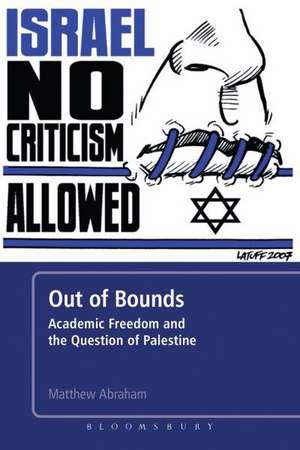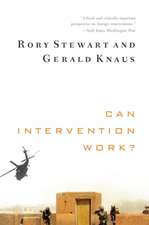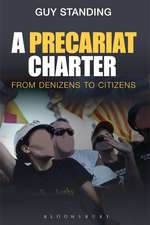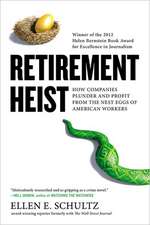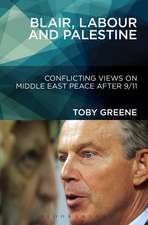Out of Bounds: Academic Freedom and the Question of Palestine
Autor Dr. Matthew Abrahamen Limba Engleză Paperback – 26 feb 2014
| Toate formatele și edițiile | Preț | Express |
|---|---|---|
| Paperback (1) | 197.17 lei 6-8 săpt. | |
| Bloomsbury Publishing – 26 feb 2014 | 197.17 lei 6-8 săpt. | |
| Hardback (1) | 719.83 lei 6-8 săpt. | |
| Bloomsbury Publishing – 26 feb 2014 | 719.83 lei 6-8 săpt. |
Preț: 197.17 lei
Preț vechi: 226.15 lei
-13% Nou
Puncte Express: 296
Preț estimativ în valută:
37.73€ • 40.97$ • 31.70£
37.73€ • 40.97$ • 31.70£
Carte tipărită la comandă
Livrare economică 23 aprilie-07 mai
Preluare comenzi: 021 569.72.76
Specificații
ISBN-13: 9781441127235
ISBN-10: 1441127232
Pagini: 392
Ilustrații: 1 halftone illus
Dimensiuni: 152 x 229 x 25 mm
Greutate: 0.64 kg
Editura: Bloomsbury Publishing
Colecția Bloomsbury Academic
Locul publicării:New York, United States
ISBN-10: 1441127232
Pagini: 392
Ilustrații: 1 halftone illus
Dimensiuni: 152 x 229 x 25 mm
Greutate: 0.64 kg
Editura: Bloomsbury Publishing
Colecția Bloomsbury Academic
Locul publicării:New York, United States
Caracteristici
A dispassionate, analytical account of how the Israel-Palestine debates are being distorted in American academia
Notă biografică
Matthew Abraham is Associate Professor of English at the University of Arizona, USA. He is the co-editor of The Making of Barack Obama: The Politics of Persuasion.
Cuprins
Acknowledgments Chapter 1: Introduction Chapter 2: The Politics of Perceiving Palestine Chapter 3: The Case of Norman G. Finkelstein Chapter 4: The Question of Palestine and the Subversion of Academic Freedom: DePaul's Denial of Tenure to Norman G. Finkelstein Chapter 5: Edward Said in the American Imagination after 9/11/01 Chapter 6: Noam Chomsky, Intellectual Labor, and the Question of Palestine Chapter 7: Recognizing the Effects of the Past in the Present: Theorizing A Way Forward on the Israel-Palestine Conflict Chapter 8: The Perils Of Separation: Fouzi El-Asmar's To Be an Arab In Israel As An Allegory Of Settler-Colonial Anxiety Chapter 9: Conclusion Notes Works Cited Appendix A Appendix B Appendix CIndex
Recenzii
Scholars and activists working on Palestine have been complaining about restrictive university governance for decades. Therefore, it is important that a study systematically assessing those restrictions has been published. Even better, the study is intelligent, rigorous, and meticulous. Abraham often deploys the specialized language of his field, but I doubt any educated reader will have difficulty understanding any of it. In this way, Abraham's work satisfies the imperatives of both academic complexity and activist urgency. I enthusiastically recommend it.
For anyone who wants to understand just how difficult it is to discuss Israel on college campuses and why that is the case, read Out of Bounds. Matthew Abraham does an excellent job of showing how pro-Israel forces attempt to silence anyone who dares to criticize Israel, which seriously threatens academic freedom.
All knowledge is political but there is perhaps no academic or public discourse in the post-War West that is more politicized and, hence, more one-sided than the one about the Zionist colonial enterprise in Palestine. This discourse converted the Jewish settler-colonialism into a movement for Jewish national liberation; it represented Israel's persecution and ethnic cleansing of Palestinians as the struggle for survival of the Jewish people; it demonized its Palestinian and Arab victims as anti-Semites, terrorists and worse. In Out of Bounds, Abraham documents the diverse methods that Zionists and their Western allies--liberals and Christian fundamentalists--have employed to police and structure this discourse in two critical arenas: the academia and media. Carefully and thoroughly, Abraham maps the strategies and tactics that a complex and well-endowed nexus of think tanks, media, politicians, academics, experts and hacks--all working in concert with Israel--employed to persecute and malign several leading Americans (a few of Palestinian origin) who were committed to uncovering the truth about the Zionist project: especially Norman Finkelstein, Edward Said, Noam Chomsky, El-Asmar, President Carter and Rachel Corrie. This is the first study of its kind --and it deserves the closest attention of all parties interested in a peaceful denouement to the Zionist project.
For anyone who wants to understand just how difficult it is to discuss Israel on college campuses and why that is the case, read Out of Bounds. Matthew Abraham does an excellent job of showing how pro-Israel forces attempt to silence anyone who dares to criticize Israel, which seriously threatens academic freedom.
All knowledge is political but there is perhaps no academic or public discourse in the post-War West that is more politicized and, hence, more one-sided than the one about the Zionist colonial enterprise in Palestine. This discourse converted the Jewish settler-colonialism into a movement for Jewish national liberation; it represented Israel's persecution and ethnic cleansing of Palestinians as the struggle for survival of the Jewish people; it demonized its Palestinian and Arab victims as anti-Semites, terrorists and worse. In Out of Bounds, Abraham documents the diverse methods that Zionists and their Western allies--liberals and Christian fundamentalists--have employed to police and structure this discourse in two critical arenas: the academia and media. Carefully and thoroughly, Abraham maps the strategies and tactics that a complex and well-endowed nexus of think tanks, media, politicians, academics, experts and hacks--all working in concert with Israel--employed to persecute and malign several leading Americans (a few of Palestinian origin) who were committed to uncovering the truth about the Zionist project: especially Norman Finkelstein, Edward Said, Noam Chomsky, El-Asmar, President Carter and Rachel Corrie. This is the first study of its kind --and it deserves the closest attention of all parties interested in a peaceful denouement to the Zionist project.
